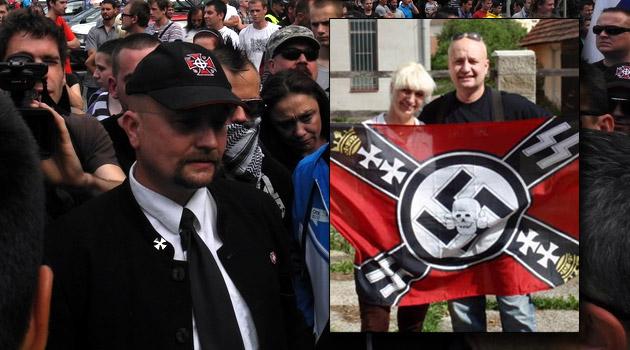Czech Republic: 136 people detained during neo-Nazi protest, no one charged yet

Eight people were injured during clashes between anti-Roma demonstrators and police at the Máj housing estate in České Budějovice which did not end until late in the evening on 6 July. Police spokesperson Lenka Holická told the Czech News Agency that officers detained 136 people and have initiated criminal proceedings on suspicion of violence against a public official in six cases.
For the time being no one has been charged and police have already released all those detained. Officers confiscated 25 weapons from the demonstrators, such as bars, baseball bats, brass knuckles and gas weapons.
Mayor of České Budějovice Juraj Thoma said he considered the police intervention yesterday to have been completely professional. News server Romea.cz followed the situation there in real time online all of Saturday (see http://www.romea.cz/en/news/czech-republic-400-czech-and-romani-neighbors-hold-calm-discussions-while-police-hold-neo-nazis-back).
"Police detained 136 people and initiated criminal proceedings in six cases on suspicion of committing felony violence against a public official. The other 130 cases were misdemeanor offenses. Another 22 people were detained by officers for the purposes of identifying them," Holická said.
As we reported yesterday, eight people were injured during the 6 July violence. "Doctors at the České Budějovice Hospital treated eight people from the demonstration, six activists and two police officers. All were released but one who has remained in the hospital with a concussion. Most of the injuries were contusions and lacerations," hospital spokesperson Ivana Kerlesová told the Czech News Agency.
On Saturday, 29 June, 13 people required medical treatment after the first demonstration, 10 activists and three police officers. All but one with a concussion were released that same evening as well.
Police intervened yesterday at the housing estate against those participating in an unannounced anti-Roma demonstration after the town hall officially dispersed their assembly and they moved out of the center of town. The demonstrators wanted to set off together from the square for the housing estate, which is home to a large Romani community.
Hundreds of police officers were waiting at the scene to push the most aggressive radicals back and pacify them. An article summarizing yesterday’s violence is here (see http://www.romea.cz/en/news/czech/czech-police-disperse-unannounced-demonstration-against-roma-eight-people-injured).
Mayor Thoma said he considered yesterday’s intervention completely professional, as police underestimated nothing and there was enough equipment and people at the scene. He also emphasized that the Máj housing estate is not like the Chánov or Matiční housing estates elsewhere in the country, places which are occupied almost exclusively by Romani people.
The Máj housing estate is home to 22 000 people, of whom approximately 400 are members of the Romani minority. There are no broken windows, devastated buildings, piles of garbage or wrecked cars on the streets there.
"The housing estate is completely in good repair, the people living in the prefabricated buildings there have invested a great deal of money into the heating systems and repairs, and the town has invested CZK 200 million over the past five years into revitalizing public spaces there, building up the landscaping, parking spaces, playgrounds and sidewalks. This place is not marginalized," the mayor emphasized, adding that socially the housing estate is not homogenous, but diverse, and that new apartment buildings and houses are being built on its outskirts which are selling well.
Several church institutions and organizations as well as civic associations perform field social work at the housing estate and the town co-finances their activities. They primarily focus on recreational activities for youth from the minority community.
"We’ll see whether there are enough playgrounds, we will have a meeting with the citizens about that on Tuesday. We know how to provide increased oversight of the residents’ security, but we don’t know how to resolve welfare issues. The greatest complaints are that the welfare system is unfair and the minority abuses it," Thoma said.